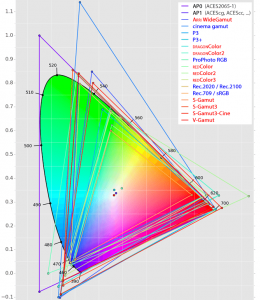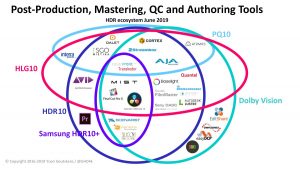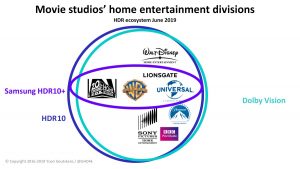https://en.wikipedia.org/wiki/List_of_open-source_codecs
Video codecs
x264 – H.264/MPEG-4 AVC implementation. x264 is not a codec (encoder/decoder); it is just an encoder (it cannot decode video).
OpenH264 – H.264 baseline profile encoding and decoding
x265 – An encoder based on the High Efficiency Video Coding (HEVC/H.265) standard.
Xvid – MPEG-4 Part 2 codec, compatible with DivX
libvpx – VP8 and VP9 implementation; formerly a proprietary codec developed by On2 Technologies, released by Google under a BSD-like license in May 2010.
SVT-AV1 – An AV1 encoder originally developed by Intel and Netflix, which is available as FLOSS now.[1] SVT-AV1 is generally considered to be the most optimized and fastest free AV1 encoder, which is why it serves as the base for the development of new, free, general-purpose and production-ready implementations in the AOMedia Software Implementation Working Group.[2] While SVT-AV1 already performs very well in constrained quality mode and is economically usable for many scenarios, as of the time being commercial implementations like Aurora1 may still beat it.[3]
xvc – An open source video codec, aiming to compete with h.265 and AV1. The reference implementation is released under the LGPL 2.1 and currently available in version 2.0 (as of 12/2020)[4]
FFmpeg codecs – Codecs in the libavcodec library from the FFmpeg project (FFV1, Snow, MPEG-1, MPEG-2, MPEG-4 part 2, MSMPEG-4, WMV2, SVQ1, MJPEG, HuffYUV and others). Decoders in the libavcodec (H.264, SVQ3, WMV3, VP3, Theora, Indeo, Dirac, Lagarith and others).
Lagarith – Video codec designed for strong lossless compression in RGB(A) colorspace (similar to ZIP/RAR/etc.)
libtheora – A reference implementation of the Theora format, based on VP3, part of the Ogg Project
Dirac as dirac-research, a wavelet based codec created by the BBC Research, and Schrödinger, an implementation developed by David Schleef.[5]
Huffyuv – Lossless codec from BenRG
Daala – Experimental Video codec which was under development by the Xiph.Org Foundation and finally merged into AV1.
Thor – Experimental royalty free video codec which was under development by Cisco Systems, and merged technologies into AV1.
Turing – A High Efficiency Video Coding (HEVC/H.265) encoder implemented by BBC Research.
libaom – Reference implementation for the royalty free AV1 video coding format by AOMedia, inheriting technologies from VP9, Daala and Thor.
Audio codecs[edit]
FLAC – Lossless codec developed by Xiph.Org Foundation.
LAME – Lossy compression (MP3 format).
TooLAME/TwoLAME – Lossy compression (MP2 format).
Musepack – Lossy compression; based on MP2 format, with many improvements.
Speex – Low bitrate compression, primarily voice; developed by Xiph.Org Foundation. Deprecated in favour of Opus according to www.speex.org.
CELT – Lossy compression for low-latency audio communication
libopus – A reference implementation of the Opus format, the IETF standards-track successor to CELT. (Opus support is mandatory for WebRTC implementations.)
libvorbis – Lossy compression, implementation of the Vorbis format; developed by Xiph.Org Foundation.
iLBC – Low bitrate compression, primarily voice
iSAC – Low bitrate compression, primarily voice; (free when using the WebRTC codebase)
TTA – Lossless compression
WavPack – Hybrid lossy/lossless
Bonk – Hybrid lossy/lossless; supported by fre:ac (formerly BonkEnc)
Apple Lossless – Lossless compression (MP4)
Fraunhofer FDK AAC – Lossy compression (AAC)
FFmpeg codecs in the libavcodec library, e.g. AC-3, AAC, ADPCM, PCM, Apple Lossless, FLAC, WMA, Vorbis, MP2, etc.
FAAD2 – open-source decoder for Advanced Audio Coding. There is also FAAC, the same project’s encoder, but it is proprietary (but still free of charge).
libgsm – Lossy compression (GSM 06.10)
opencore-amr – Lossy compression (AMR and AMR-WB)
liba52 – a free ATSC A/52 stream decoder (AC-3)
libdca – a free DTS Coherent Acoustics decoder
Codec2 – Low bitrate compression, primarily voice


